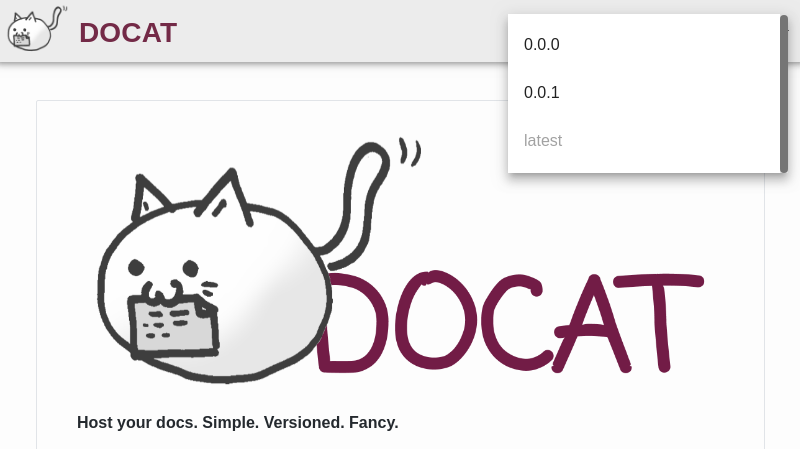Host your docs. Simple. Versioned. Fancy.
The simplest way is to build and run the docker container, you can optionally use volumes to persist state:
# run container in background and persist data (docs, nginx configs and tokens database)
# use 'ghcr.io/docat-org/docat:unstable' to get the latest changes
mkdir -p docat-run/db && touch docat-run/db/db.json
docker run \
--detach \
--volume $PWD/docat-run/doc:/var/docat/doc/ \
--volume $PWD/docat-run/locations:/etc/nginx/locations.d/ \
--volume $PWD/docat-run/db/db.json:/app/docat/db.json \
--publish 8000:80 \
ghcr.io/docat-org/docatAlternative: Mount a dedicated directory to host db.json :
# run container in background and persist data (docs, nginx configs and tokens database)
# use 'ghcr.io/docat-org/docat:unstable' to get the latest changes
mkdir -p docat-run/db && touch docat-run/db/db.json
docker run \
--detach \
--volume $PWD/docat-run/doc:/var/docat/doc/ \
--volume $PWD/docat-run/locations:/etc/nginx/locations.d/ \
--volume $PWD/docat-run/db:/var/docat/db/ \
--env DOCAT_DB_PATH=/var/docat/db/db.json
--publish 8000:80 \
ghcr.io/docat-org/docatGo to localhost:8000 to view your docat instance:
If you want to run the application different than in a docker container, look at the backend and web docs.
The preferred way to push documentation to a docat server is using the docatl command line application:
docatl push --host http://localhost:8000 /path/to/your/docs PROJECT VERSIONThere are also docker images available for CI systems.
If you have static html documentation or use something like mkdocs, sphinx, ... to generate your documentation, you can push it to docat:
# create a zip of your docs
zip -r docs.zip /path/to/your-docs
# upload them to the docat server (replace PROJECT/VERSION with your projectname and the version of the docs)
curl -X POST -F "[email protected]" http://localhost:8000/api/PROJECT/VERSIONWhen you have multiple versions you may want to tag some version as latest:
# tag the version VERSION of project PROJECT as latest
curl -X PUT http://localhost:8000/api/PROJECT/VERSION/tags/latestIt is possible to configure some things after the fact.
- Create a
config.jsonfile - Mount it inside your docker container
--volume /path/to/config.json:/var/www/html/config.json
Supported config options:
- headerHTML

